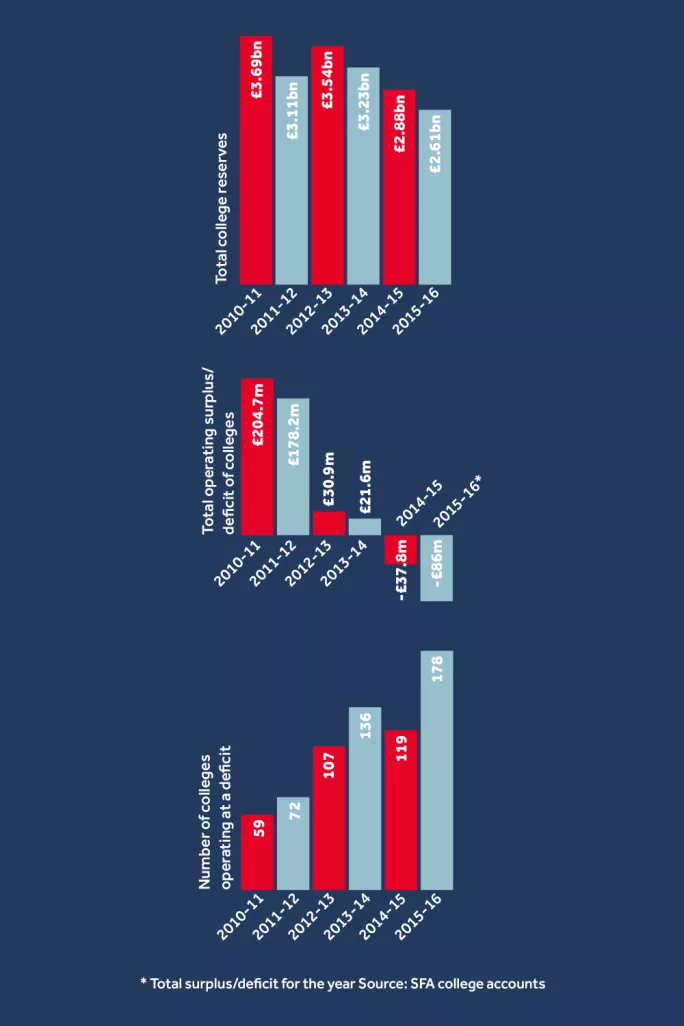The level of reserves held by colleges has dropped by ┬Ż1 billion over the past five years, according to analysis by Tes.
The total reserves held by colleges across England has╠²decreased from ┬Ż3.69 billion in 2010-11 to ┬Ż2.61 billion in 2015-16, according to college accounts. The trend broadly matches the drop in the overall core budget for adult skills, which fell from around ┬Ż3 billion to ┬Ż2 billion between 2009 and 2015.
This suggests that more colleges have dipped into their reserves to replace government funding. Julian Gravatt, deputy chief executive of the , said that other factors leading to a reduction in collegesŌĆÖ reserves could include changes in pension deficits and capital expenditure.
But a lower level of reserves was a concern, he added: ŌĆ£That means there is a risk of colleges losing control. It is an unpredictable environment. There will be some colleges that have too many reserves, but it is unusual.ŌĆØ
ŌĆśInadequateŌĆÖ financial health
In 2015, the National Audit Office warned that the number of colleges under financial strain was expected to rise ŌĆ£rapidlyŌĆØ. The financial position of the sector had been declining since 2010-11, said an NAO report, which highlighted that the number of colleges assessed by the Skills Funding Agency to have ŌĆ£inadequateŌĆØ financial health had risen from 12 in 2011 to 29 in 2015.
ŌĆ£The decline in the financial health of the sector has been quicker than indicated by collegesŌĆÖ plans, and current forecasts suggest that the number of colleges under strain is set to rise rapidly,ŌĆØ the NAO concluded at the time. At present, 41 colleges are subject to a notice of concern over their financial health.
In 2015-16, had the biggest reserves of ┬Ż152 million, followed by (with which it has now merged) on ┬Ż107 million╠²and on ┬Ż63 million.
ŌĆśResilient to economic challengesŌĆÖ
saw its reserves drop by almost a third in 12 months, according to the latest college accounts, from ┬Ż74.1 million in 2014-15 to ┬Ż50.8 million the following year. A spokeswoman for the group said this was ŌĆ£primarily due to some substantial one-off restructuring costs of ┬Ż20.6 million in 2015-16ŌĆØ, incurred to ensure the businessŌĆÖ ŌĆ£long-term successŌĆØ.╠²The group was now in an ŌĆ£excellent financial positionŌĆØ, she said, adding: ŌĆ£Our strong balance sheet and cash reserves enable us to be resilient to economic challenges. This is particularly important, given the significant economic uncertainty the UK faces.ŌĆØ
Some colleges, however, bucked the trend. Over the same period, increased its reserves from ┬Ż26.5 million to ┬Ż32.2 million. Principal Ian Pryce said the college had looked at reducing its pension liabilities, and reserves had increased because it had challenged ŌĆ£the actuarial assumptionsŌĆØ.
A new insolvency regime for colleges was created under the╠²Technical and Further Education Act, which became law in April.
╠²
This is an edited version of an article in the 18╠²August╠²edition of╠²Tes. Subscribers can read the full article╠²here╠²To subscribe, click╠²here.╠²This weekŌĆÖs╠²Tes╠²magazine is available at all good newsagents.╠²To download the digital edition, Android users can╠²╠²and iOS users can╠².
Want to keep up with the latest education news and opinion? Follow╠²Tes╠²FE News╠²on╠²,╠²like us╠²on╠²╠²and follow us on╠²






